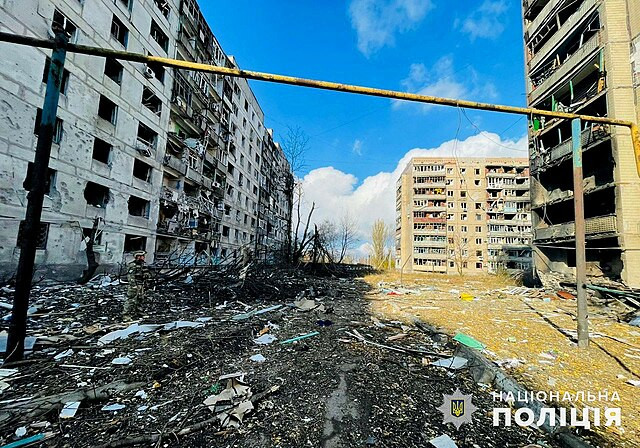Russia and Ukraine escalated their conflict over the weekend with a series of drone and missile strikes that left dozens injured and caused significant damage to infrastructure. Ukrainian President Volodymyr Zelenskyy called for "unwavering" support from Western allies, urging stricter sanctions on Moscow and increased arms supplies to Kyiv.
In the northeastern city of Kharkiv, located just 19 miles from the Russian border, Russian missile strikes injured at least 23 people and damaged more than 40 buildings, according to local authorities. Zelenskyy said the weapon used in the attack was an S-400 anti-aircraft missile, part of a broader assault that targeted several Ukrainian cities, including Kyiv, Odessa, and Zaporizhzhia.
"These Russian attacks on Ukrainian life can be stopped," Zelenskyy said in a Telegram post. "With pressure, sanctions, blocking the occupiers' access to the components they use to create the tools of this terror, arms packages for Ukraine, and a resolve that must be unwavering."
Ukraine's air force reported that Russia launched 145 drones in a coordinated overnight offensive, with 71 being intercepted or lost in flight. In Kyiv, residents endured hours of buzzing engines from attack drones, punctuated by bursts of automatic gunfire as air defenses worked to neutralize the threat.
In the southern Mykolaiv region, drone strikes caused temporary power outages, while industrial sites in Zaporizhzhia were also hit. Russian officials maintain that they do not target civilians, but Ukrainian authorities highlighted extensive damage to residential areas as evidence to the contrary.
Ukraine launched its own counteroffensive, striking targets deep inside Russian territory. Explosions were reported in the Kursk region, where Governor Alexei Smirnov said seven missiles and seven drones were intercepted. Strikes also ignited fires at oil facilities in Kaluga, including an oil depot and refinery.
Russian forces have ramped up efforts along Ukraine's eastern front, with Moscow's Defense Ministry claiming progress in the Kharkiv region. Ukrainian sources reported assaults near Kozacha Lopan, a settlement close to the border, as well as an amphibious operation across the Oskil River, where Russian troops are pushing to capture Kupyansk, a key logistics hub.
Ukraine's Ministry of Defense, meanwhile, announced successful strikes against critical Russian infrastructure in Kursk, Kaluga, and Bryansk. "On the night of November 25, 2024, units of the Main Intelligence Directorate of the Ministry of Defense of Ukraine together with other components of the Defense Forces attacked a number of important objects of the occupiers," the ministry said on Telegram.
Beyond the battlefield, reports emerged of a British national captured in Russia's Kursk region while fighting for Ukraine. Russian state media identified the individual as James Scott Rhys Anderson, a former British Army signalman who later became a military instructor for Ukrainian forces.
In a video published by the Russian news agency Tass, Anderson stated in English that he did not wish to be "here." If verified, this would mark one of the first publicly known cases of a Western fighter captured on Russian soil.
Russia continued to target Ukraine's energy infrastructure, with missile and drone strikes affecting multiple regions. In Odessa, missile strikes injured ten people and damaged residential buildings, while similar attacks in Mykolaiv disrupted power supplies. Ukrainian officials have warned of potential long-term power outages as winter approaches, stoking fears of a repeat of last year's energy crisis.
Moscow's use of cost-effective "suicide" drones and decoy UAVs aims to overwhelm Ukraine's air defenses, according to officials in Kyiv. Zelenskyy has called on international allies to ramp up support for Ukraine's air defense systems and to cut off the supply of components that enable Moscow's weapons production.
The war, now nearing its third year, shows no signs of abating.




